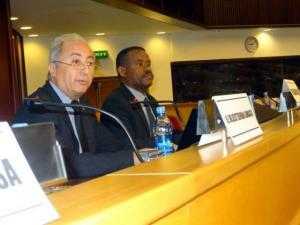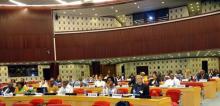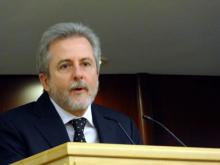An International Forum on “Evidence Informed Health Policy in Low and Middle Income Countries” kicked off in Addis Ababa
Addis Ababa, 29 August 2012 -- The “Evidence Informed Health Policy in Low and Middle Income Countries” Forum which is coorganised by the WHO Headquarters and the Country Office, the Evidence – informed Health Policy Network (EVIPNet), Supporting the Use of Research Evidence in African Health Systems” (SURE), the Regional East African Community Health (REACH) Policy, the Ethiopian Health and Nutrition Research Institute (EHNRI) and the European Commission kicked off yesterday in the presence of Dr. Amha Kebede, representing H.E. Dr. Keseteberhan Admasu, State Minister of the Federal Ministry of Health (FMOH) and Dr. Khaled Bessaoud, Acting Country Representative to WHO Ethiopia.
The forum brings about 110 participants - researchers, PhD students from various universities, health officials, journalists, and WHO staff - together from all over the world.
In his opening remark, Dr. Khaled Bessaoud, Acting Country Representative to Ethiopia, stated that “the aims of the workshop are to strengthen efforts in countries in the translation of research findings in to policy and action by establishing appropriate mechanisms and structures, including setting up of networks of researchers, of decision makers and of policy makers for evidence based public health actions.
It also aims to enhance the relevance of the research to users, policy –makers and communities by linking research activities to health challenges and priorities in order to bridge the know-do gap.” Highlighting the importance of the forum, He mentioned that “it will give us a unique opportunity for an indepth review of the challenges and implementing evidence brief policy with a focus on Low and Middle income countries. He underscored that it would also help strengthen knowledge sharing among researchers and policy makers, as well as introduces knowledge tools that will enable efficient policy development and implementation in the spirit of the Algiers declaration.
In concluding his remarks, Dr. Khaled expressed, “WHO welcomes the opportunity of promoting interaction and networking among all participants.”
Dr. Amha Kebede, Acting Director General of the EHNRI, representing the FMOH, flagged out why and how the health disparities between the poorest and the least poor are growing. He said, “ As in many low-income countries, this is a consequence of the “know-do gap; the inaction or delay in applying the available evidence, knowledge and best practices, and the delay in conducting research of immediate relevance to policy and decision makers striving for equity-centered health development”.
Recognizing the opportunities evolving with the growing research and development, he said, “The fact that research and development has produced sufficient tools to substantially reduce the burden of disease if effective health policies and systems can be implemented means that there will be many early wins and low hanging fruit to harvest by facilitating more evidence – informed policy making, and more research serving policy needs.”
Dr. Amha urged all researchers to support in providing quality evidences and system based findings that will allow us to use our limited resources appropriately and cost effectively.
Representing EVIPNet and SURE, Dr. Ulysses Panisset and Susan Munabi Babigumira respectively, during their respective welcoming remark commended WHO Ethiopia, FMOH and EHNRI for hosting the event. In her briefing, Ms. Babigumira gave an overview of the SURE project, its objectives, and described different resources for use in health policy development. SURE is a five year project to support the buildup of evidence-informed policy-making in Africa.
Dr. Ulysses said that this initiative creates an opportunity to bring together the scientific advances to allow us to make use of standards and evidences for policy making actions. The forum, he said, aims to discuss the importance of research in generating evidences and scientific information for development of sound health policy, promote for its applications by drawing experiences from countries in Africa, Canada, and Europe, share resources that are useful to support health policy development processes and enhance participants’ skills and knowledge in developing evidence-informed health policy. He highlighted that the country teams are the cornerstone of evidence-informed policies, because “whether or not scientific knowledge is global, the use of knowledge is local”. The Federal Ministry of Health appointed EHNRI as the EVIPNet Ethiopia team since the founding of EVIPNet Africa in 2006.
The event which convenes for four days will hold 36 sessions on various titles and themes; while some feature practical training; others will allow participants to gain knowledge through interactive sessions.
For furter information
Email: who-wro [at] et.afro.who.int
P.O. Box: 3069; Fax: +251115514037; Phone: +2511155347
An International Forum on “Evidence Informed Health Policy in Low and Middle Income Countries” kicke






